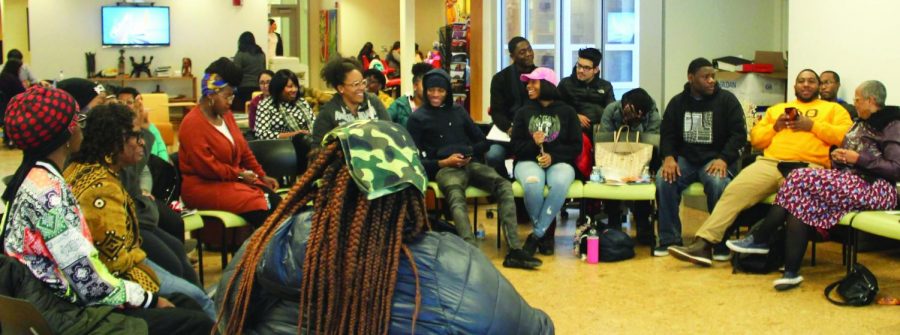Creating respect for natural hair
Our Hair Is Our Crown
The audience share the experiences they have had with hairstyle discrimination and texturism. | Photo by Tim Le Cour
December 3, 2019
On Nov. 14, Timothy Mays collaborated with NEIU sociology students to plan an event titled “Her Hair Is Her Crown,” a discussion event which called attention to discrimination between people’s hairstyles and hair textures (mainly applied towards women of color). The event saw people share with one another their experiences with hairstyle and texture discrimination.
At the beginning of the event, sheets of paper were placed on every other seat. On these sheets of paper were posts and memes from various social media platforms explaining “relatable” moments involving people with “kinky, ziggly or curly” hair, based on the most common hair grade charts. Some of the posts also expressed serious, more direct messages projecting that texturism and hair discrimination is unacceptable, and that women of color should wear their hair as they please, regardless of society’s conformity regarding hairstyles.
The event started with an introduction to the Crown Coalition, an organization founded by Sen. Holly J. Mitchell to birth the CROWN Act which stands for Creating a Respectful and Open World for Natural Hair.
According to the website, thecrownact.com, CROWN Act “ensures protection against discrimination based on hairstyles by extending statutory protection to hair texture and protective styles.”
Next, the sociology students gave a short presentation on the history of hair discrimination, starting with the Tignon Law of the 1700s before explaining the spiritual meaning behind natural hair from as early as 2500 BCE to present day.
Then came the discussion portion of the event which was mostly critical in nature. Around 20 men and women of color shared their experiences of hairstyle discrimination and texturism, which ranged from other people touching their hair as if they were an animal to memories of hot comb burns from mothers that kept trying to straighten their hair.
The audience was also asked to share about instances where they had to change their hair for the sake of social inclusion. The discussion also touched on the generational gap and disparities in grooming expectations between baby boomers and Generation Z.
As of Nov. 29, the Crown Coalition has collected approximately 44,000 signatures towards the CROWN Act, about 1,000 short from their intended goal of 45,000.
To learn more about the CROWN Act and sign the petition to provide a safer, non-discriminatory environment of having people of color express themselves through their natural hair, visit https://campaigns.organizefor.org/petitions/help-make-hair-discrimination-illegal.








